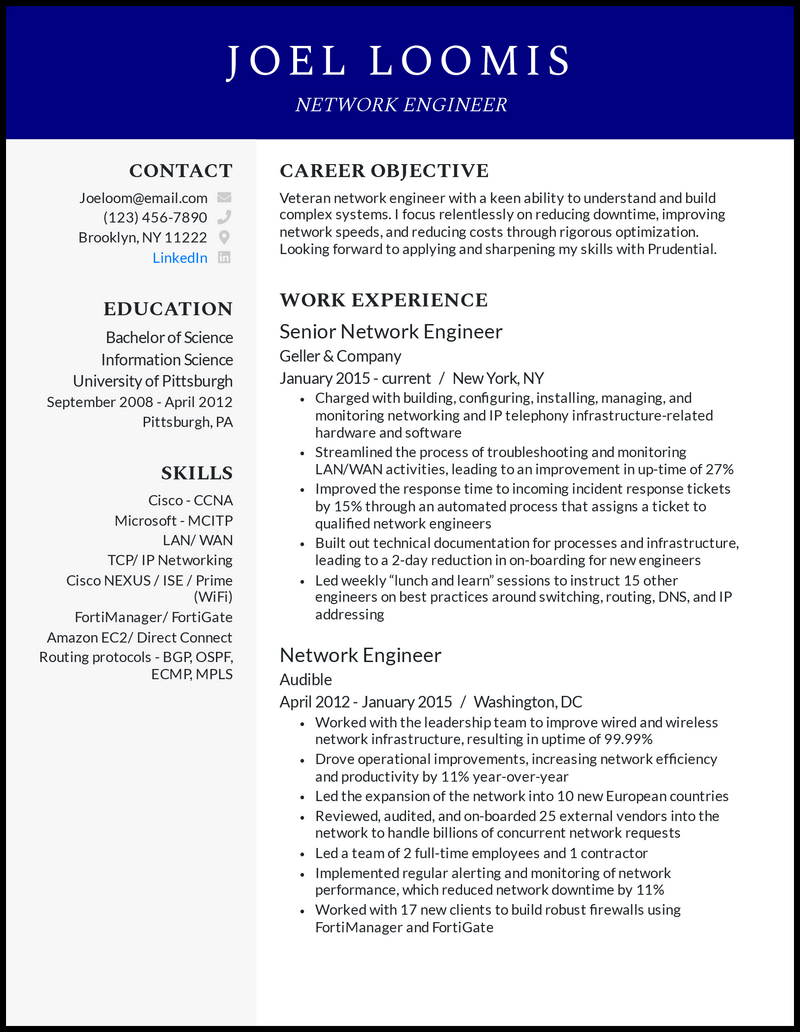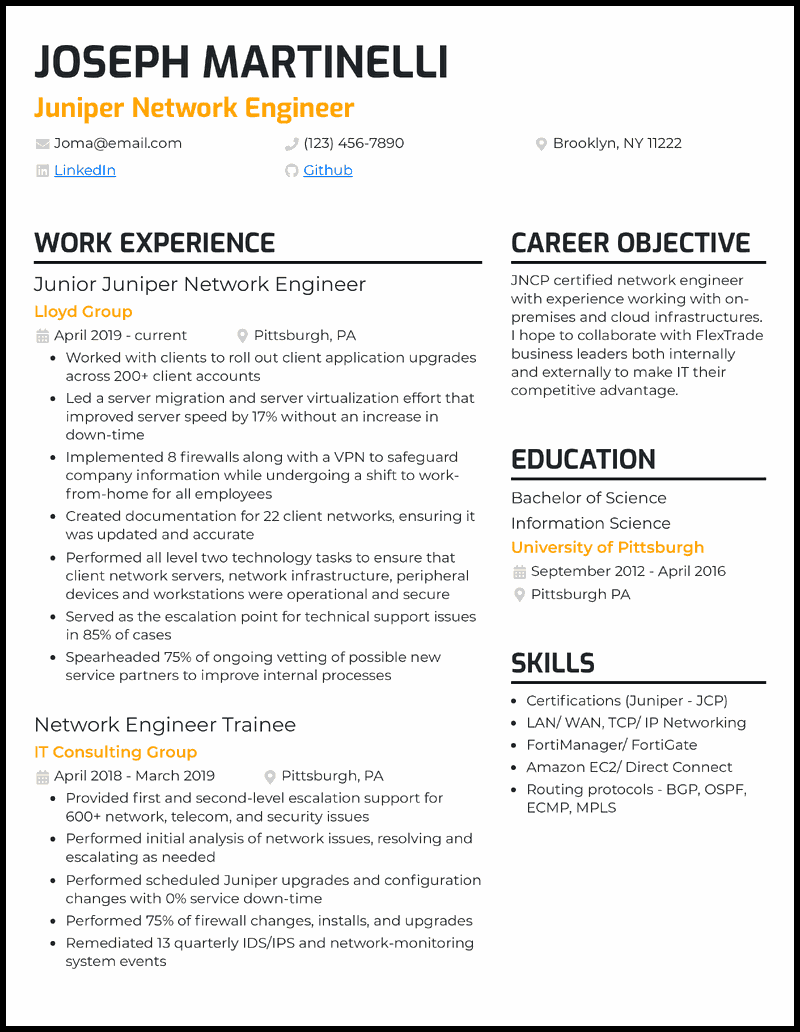
Network Engineer





Best for candidates with 3+ years of experience
Resume Builder
Like this template? Customize this resume and make it your own with the help of our Al-powered suggestions, accent colors, and modern fonts.
Write a network engineer resume that fits the description in the job advert.
Let your metric-backed accomplishments, skills, the right keywords, and the perfect layout convince recruiters you’re fit to start the job immediately. Besides, these ChatGPT resume prompts can help refine your document to stand out.
Here’s what we’ll cover in this guide:
- ↪ 17 real-world network engineer resume examples to inspire your next draft
- ↪ What hiring managers look for in a standout network engineer resume
- ↪ A breakdown of essential sections—from summary to certifications—done right
- ↪ Tips for writing bullet points that showcase real impact (not just responsibilities)
- ↪ How to align your resume with different roles like security, cloud, or systems networking
Why this resume works
- When reviewing your network engineer resume, hiring managers have to quickly assess whether or not they think you’ll have a meaningful impact on their business. By demonstrating you’ve had a measurable effect on your past roles, you’ll make a convincing case that you deserve an interview.
- Strong use of action verbs like “drove,” “led,” and “implemented” succinctly demonstrate that you can take ownership of your roles.
Why this resume works
- Your senior network engineer resume should show you’ve worked on a wide variety of different projects, from security to support to planning.
- Strut your stuff with a savvy resume format that highlights your most recent experience, also known as reverse-chronological order.
See more senior network engineer resumes>
Why this resume works
- One of the questions recruiters would want your network security engineer resume to answer is how prompt you are with detecting and resolving issues. Highlight your almost perfect record of responding to system threats and show you solved them instantly.
Why this resume works
- Without work experience, you may think the odds are against your junior network engineer resume and you cannot land this job.
- Your secret weapon here is highlighting projects that you feel are related to the job, emphasizing the impact and real-world application of the outcomes.
Why this resume works
- What will it take to shine brighter than the competition, you wonder? Unknown to most candidates, tailoring your wireless network engineer resume to the job description is the secret to pulling that off.
Why this resume works
- The header on your network support engineer resume is the opening act engineered to catch the recruiter’s attention instantly. So, if you’re itching to secure that position, make sure it’s spot-on.
Why this resume works
- So, let’s say you’re pretty much the king or queen of all things network—we’re talking both the tangible cables and the invisible signals. But can you wow the hiring manager to the point where they’re itching to discuss your suitability for the Cisco network engineer position? Highlighting your role-relevant tertiary education could be your golden ticket.
Why this resume works
- The competition for such a role is stiff, and you need a convincing cloud network engineer resume to make a solid first impression.
- Your competency in job-specific tools will set you apart from the rest. Showcase how you’ve used them to make a significant impact in your previous jobs.
Why this resume works
- As a network engineer with several years of experience, your education section should only occupy a small percentage of your overall CCNA network engineer resume.
- Let your work history, in a reverse-chronological resume format, hog the spotlight!
See more CCNA network engineer resumes>
Why this resume works
- When you’re applying for a more specialized role, you want your Juniper network engineer resume to showcase your experience in that specialization.
- If you choose to have a resume objective, make it clear that you’re experienced and looking for a role in Juniper.
See more Juniper network engineer resumes>
Why this resume works
- Capitalize on concise bullet lists to structure the work history of your network field engineer resume. They enhance readability and play nicely with the picky electronic bouncers that are ATS systems.
Why this resume works
- A network automation engineer resume that thrusts your capability to crush it in the field in the limelight can get you an interview, at the very least. How do you craft it, though? We propose quantifying your accomplishments.
Why this resume works
- Well, showing how you reduced costs for network equipment is one sure way to stand out from the crowd.
- In fact, your F5 network engineer resume may emerge at the top of the stack for disclosing your ability to evaluate vendors and ensure sustainable cost reduction for crucial supplies.
Why this resume works
- Whichever your wins, showcase them with a splash of metrics for extra punch. “Processed network logs using SolarWinds NPM, identifying and mitigating eight critical issues within a quarter and thus preventing a potential revenue loss of $600K” is a welcome addition to an ISP network engineer resume.
Why this resume works
- The quality of writing in your optical network engineer resume is every bit as big of a deal as the skills and experiences you pack into it, so don’t sleep on giving it a good once-over for errors. Capitalize on software like Grammarly to weed out typos, punctuation errors, and run-on and passive sentences that could torpedo your chances of a job interview.
Why this resume works
- That empty spot on the side column of your VoIP network engineer resume? It’s the prime real estate for your Skills section to shine. And its content? Gems like H.323, Zoiper, Polycom VVX Series, Cisco VG Series Gateways, Cisco Prime Collaboration, and Wireshark.
Why this resume works
- Unlike the “Senior network engineer” resume above, your entry-level network engineer resume needs to convey your qualifications without an extensive work history.
- Include any relevant projects you worked on outside of the school setting that demonstrate what it takes to be a successful network engineer.
See more entry-level network engineer resumes>
Related resume guides
How to Format a Network Engineer Resume

A network engineer resume should be a professional, cumulative reflection of your qualifications and relevant work experience.
As a network engineer, you need a complete summary of your career, thus far, in a logical, legible format. Several questions you should ask yourself and steps you can take to guarantee readability and rational structure are:
- Should you use a reverse-chronological, functional, or combination/hybrid format for your network engineer resume?
- How should your resume contact header look?
- How can you get through the ATS?

Should you use a reverse-chronological, functional, or combination/hybrid format for your network engineer resume?
To make your network engineer resume impactful in 2026, technical recruiters rely on clean formatting to quickly dissect your resume. Strong action verbs and quantifying your projects are just a few qualities that make a great resume. Without structure, a recruiter may struggle to decipher your comprehensive list of skills from your education or active projects. Feel free to review our example resumes, formatting guides, and resume templates for quick tips. Below we’ve detailed popular formats:
- The most popular format is reverse-chronological order. Reverse-chronological formatting lists all experience, from the most recent project or career opportunity to your first relevant skill or experience. Each item is typically dated to give perspective of your career path. You’ll likely have a straightforward career growth path that distinctly aligns with the reverse-chronological formatting.
- A functional resume groups career experience and relevant details based on a specific skill or focus.
- The mixture of both formats is considered a hybrid/combination. Many recruiters prefer a hybrid format if you have career gaps or relevant work experience spread throughout your career path. Organizing your most relevant job-specific career experience in reverse-chronological order gives the recruiter a better understanding of when you learned your skills and what depth you possess knowledge in the subject matter.

Your resume contact header
Your contact information should be one of the first things a hiring director reads on your resume. The information should be easy to find, color-coordinated, and titled but also self-explanatory. Other titles showing details such as social media pages, phone numbers, or addresses should be bold or emphasized. Keep font style and size consistent with the other equally important, relevant work experience displayed on your network engineer resume. To separate the content of your resume title, name, and contact information, a header is formed at the top of the page. The header shouldn’t exceed the standardized page margins. You can check out our resume examples to set your best foot forward!

How can you get through the ATS?
ATS stands for applicant tracking system. Applicant tracking system (ATS) software filters through resumes submitted to technical recruiters to simplify their hiring process. Each resume is typically collected from the submission window, sorted, scanned, and ranked for future readers. A whopping 90+% of top employers in every field and Fortune 500 company uses ATS software. A resume scanner removes the guesswork when crafting your resume.
ATS software is a common tool to reduce the hours and overhead required to review potential applicants. However, your network engineer resume may be ranked or disqualified before a human ever reads it due to ATS software. Our resume builder system is ATS compliant by default. You’ll have the flexibility to include relevant career experiences in a structured format that works for any future employer’s ATS software. Here are the main attributes an ATS reviews:
- Fonts
- Font sizes
- Margins
- Header names
- Structure / Logical order
- Resume page length
How to Write a Network Engineer Resume

Effective writing helps your network engineer resume shine in comparison to the competition. Word choice convinces hiring managers that you can make a measurable difference in their company.
Summary
Command attention with a network engineer resume that showcases your technical mastery, quantifies your infrastructure impact, and aligns every credential with mission-critical business needs.
Your words shouldn’t leave the reader impression that your resume is just an exhaustive list of skills or expertise. Instead, it should be carefully crafted and focused on the specific position available.
Our resume builder can guide you through the must-haves for a standout network engineer resume as below:
- Must you include an objective or summary in your network engineering resume?
- Network engineer work experience
- The best network engineer skills
- Education and certifications required for a network engineer
- What about projects, interests, or hobbies in your network engineering resume?
- Create multiple network engineering resumes
- Edit your network engineering resume using our how-to-write-a-resume guide

Must you include an objective or summary in your network engineering resume?
You may write an objective or summary to help tailor your network engineer resume to a particular open role. However, not all resumes include an objective or summary. To save space or simplify, include this information in your cover letter. Nevertheless, it’s quintessential that you do so correctly if you choose to write an objective or summary. A poor objective or summary is commonly vague or generic.
Check out these examples:
- Good Objective—Harvard computer science graduate with web design experience looking to expand my 11-year web development career at Squarespace to help simplify the online shop creation process for small business owners.
- Bad Objective—I’d like to improve my Full-Stack web development capabilities for a year before branching into bleeding-edge technology such as artificial intelligence at Alphabet.
- Good Summary—Industry-leading executive with 10 years of experience broadening the electric vehicle market. In 2011, founded and grew a start-up into a $1 billion evaluation.
- Bad Summary—Joined a hot start-up and procured necessary investors to grow the company into an industry leader. Graduated with an MBA in 2010.
A strong objective specifies your intent or shares focused, relevant work experience that applies to the open role. Objectives should display who you are, what you have to offer the employer, and how you can help further the company’s accomplishments and goals. A good summary establishes the cumulative highlights of your relevant work experience with just a few sentences, quantitative values, and keywords. It explains the specific skills and expertise that make you the right choice for a particular job.

Network engineer work experience
Depending on the extent of your career thus far, not all previous opportunities should be listed on your network engineer resume. A common mistake is submitting a curriculum vitae (CV) instead of the requested resume. The difference is that you should tailor your resume to the employer’s open position with two to four relevant job experiences showing you’re the right fit for the position. Only highlight your most impactful education, experience, and expertise on your resume. Avoid including unrelated work history or irrelevant skills.
A CV contains the course of life or all qualifications you’ve achieved thus far. A resume is typically one page. However, for every 10 years of experience, you can include an additional page. On the other hand, a CV commonly has no length limitations.

Network engineering job descriptions
Each paragraph, phrase, or bullet point needs to be carefully crafted. You’ll be ranked not only by your experience but the effort you invested in describing your career journey. Use action verbs to capture the reader’s attention. From subjects to verbs, each part of speech needs to flow smoothly, tenses should remain consistent, and the vernacular should actively engage the reader. Listed below are good bullet points:
- Grew a software consultant business from $100 million in annual revenue to $150 million
- Acquired WordPress to further Automattic’s global web market share by 27%, leading to 300 million new users and 1 billion advertisement views monthly
- Transitioned from a hardware specialist intern to a full-time employee based on 3 months of high performance, 95% positive customer feedback, and academic merit, resulting in test scores consistently above a 3.5 GPA
Avoid personal pronouns and keep the language formal. Grammatically correct sentences are mandatory. Include certifications and academic accomplishments in a separate section from your work experience. Here are some bad bullet points:
- I built a web framework with HTML, CSS, and JavaScript as front-end for several clients’ websites.
- I wrote lots of C++ code to automate desktop virtualization environments for a dozen small business office computers.
- Apple sponsored my CompTIA Network+ certification through their work-study program.

Numbers speak louder than words on your network engineering resume
Quantifying work experience with statistics and measurable metrics helps employers understand the extent of your work. Metrics provide an additional layer of detail that gives greater insight into your accomplishments. Aim to include a statistic or metric concerning work in every other sentence.
Quality bullet point examples for your resume:
- Discuss your network up-time to show your presence’s impact on co-workers or clients.
- Maintained 99% up-time for all 100 networked client systems throughout the year 2020
- Outline ongoing or completed projects you participated in, including details regarding equipment used or replaced.
- Spearheaded office-wide migration to fiber-optic connectivity and upgraded all 50 routers to Wi-Fi 6E, which led to consistent internal traffic data speeds above 100MBps
- Highlight the outcome of your accomplishments and how they affected the overall bottom line or customer relationship.
- Achieved a 90% approval rating by decreasing the day-to-day customer support maintenance response time by 50%

The best network engineer skills
Several qualities make up an excellent network engineer. Employers tend to measure your potential based on the number of hard skills listed on your network engineer resume. They may uncover soft skills from brief interviews and references. Hard skills and academic-based expertise are pieces of knowledge you acquire from certifications, degrees, research, or experience. Often recruiters or the ATS will flag resumes for further review if you mention keywords, skills, or expertise specifically relevant to the open position. Examples of hard skills:

Soft skills measure character and can help assess compatibility with the existing team. The skills measure interpersonal relationship expertise and character traits. Both soft and hard skills should be mentioned on your network engineer resume six to eight times. The keywords should be listed either in the objective summary or highlighted in a separate section of the resume to increase reader visibility. Examples of soft skills:
- Adaptability
- Communication skills
- Teamwork
- Work ethic
- Interpersonal skills
- Leadership skills

The perfect action verbs for network engineer resumes
Of course, your achievements and skills speak for themselves. However, you’re not the only candidate with such stellar qualifications. Therefore, you should seize opportunities to stand out and outshine the competition.
One such effective card you can play is using action verbs to strengthen your work bullet points. By carefully selecting these power words, deploy them at the beginning of your job descriptions and tie them to skills, metrics, and impact. Nothing says you excel at your job like a point that answers all the questions a recruiter would ask before declaring you a fit candidate.
Some excellent examples of action verbs for network engineers:
- Resolved
- Debugged
- Conceptualized
- Optimized
- Launched
- Upgraded
- Tested

Education and certifications required for a network engineer
Many companies in the market differ in terms of requirements for education. However, most open network engineering roles will demand a minimum of a bachelor’s degree in a relevant science, technology, engineering, or mathematics (STEM) field. Some companies will make an exception, allowing you entrance with an associate’s degree or four years of relevant work experience. However, most entry-level positions prefer STEM-related four-year degrees. In addition to academics, employers may also require standardized industry certifications, such as Cisco Certified Network Associate (CCNA), CCNA Routing and Switching Certification (CCNA RS), CCNA Security, or CompTIA Network+.
All your related network engineering education and certifications should be clearly stated and displayed on a designated section of your network engineer resume. If a mandatory certification is a keyword in an ATS filter, you could be automatically rejected for forgetting to include this qualification on your resume. Most technical recruiters prefer to read this information first, as certifications and levels of education can be the deciding factor for hire. Senior positions look for 5-10 years of experience or post-graduate STEM degrees.

What about projects, interests, or hobbies on your network engineering resume?
As you gather more professional experience as a network engineer, listing projects, interests, and hobbies on your network engineering resume becomes less impactful. However, for interns, recent college graduates, and entry-level positions, displaying proactive applications of your knowledge can show initiative. Projects that have generated meaningful change or profit should be displayed. A great example is school projects, volunteer work, or home labs. If you’ve acquired a collection of Internet of Things (IoT) devices, 5G networks, or artificial intelligence, the expertise gained from each project is worth mentioning for germane roles.
Details of skills, expertise, and pre-existing technologies should be mentioned in your resume when applying to entry-level positions early on in your career. Projects, active or completed, can be listed, similar to work and career experience. Code contributions, open-source projects, and charity work are excellent additions to your resume. Like career experience, all hobbies, interests, and projects should display metrics and statistics concerning completed objectives. As a network engineer, you should describe how you improved the current system or changed the architecture leveraged by its users.
Examples of projects you could include:

As your network engineering career becomes vast, it’s more than acceptable to disregard interests, projects, or hobbies from your resume entirely. Your work experience is commonly seen as the most important or beneficial asset to getting hired. Frequently, the duration of your work with various companies will lead to many completed projects and tasks. It’s up to you to include the most pertinent details of your assignments. Before submitting a resume, you should review each bullet point and ask, “What value does this sentence add to my resume?” “Does it display new information?” If there’s any hesitation or sense of repetition, the phrase or paragraph should be removed.

Create multiple network engineering resumes
Any job listing will show the required skills and expertise for hire. Read through the entire open position, highlight any skills you currently possess, and then ensure this information is near the top of your network engineer resume. Customize your resume to each employer and the needs of the specific role. Taking the time to tailor your resume greatly increases a hiring manager’s chances to consider you over the competition.

Edit and proofread your network engineering resume
While many word processing programs have built-in spell-check, it’s apropos for you to proofread any document for grammatical errors. To avoid having your network engineer resume rejected for poorly written language:
- Avoid rushing an application for submission.
- Research the proper nouns, subjects, and objects listed in your document.
- Review formatting and margin requirements from the employer.
- Use our free resume checker to write out numbers versus listing numerical values.
A proofread and tailored resume shouldn’t take more than 30 minutes if you work from a solid foundation.

Write a network engineer cover letter to fortify your resume
While your resume is the most crucial document that aligns you to the job, it’s not the only ammunition you can use to fire up your application to the top of the pile. Writing a network engineer cover letter to accompany your resume allows you more space to add context to your achievements, qualifications, and relevant experiences.
Generating an effective cover letter means personalizing your application to the role and connecting your expertise to the company’s needs. For any questions hiring managers may have about your one-page resume, you now have the perfect opportunity to give them satisfactory answers.
Network Engineer Resume FAQs

In this competitive job segment, any other generic network engineer won’t make it past the ATS, let alone get reviewed by an HR manager. Therefore, your resume must be specifically crafted for the advertised position. With core network engineering skills, work experience, action verbs, and hard numbers, make yourself indispensable by mirroring exactly what the job posting wants.
An effective network engineer resume experience should reflect what the potential employer is looking for in the perfect candidate. If they prefer a candidate with a telecommunications, aviation, or computer background, find the most relevant roles from your work history and give them prominence. Don’t just mention your duties, select the most outstanding achievements, and pair them with the pertinent skills.
One page. There’s always the temptation to write a long resume, thinking that it’s your fast ticket to the job. Well, there’s a caveat. Unless you have 10 or more years of experience, a one-page resume is all you need to convince an employer you have what it takes to exceed expectations. Most of the time, the information that spills into the second page is fluff and ends up ignored by recruiters.

























